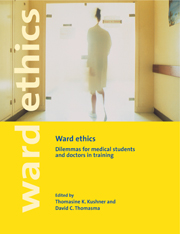Book contents
- Frontmatter
- Contents
- Acknowledgments
- List of contributors
- Prologue. Breaking the silence
- Letter from a young doctor
- Part I On caring for patients
- Section 2 Problems in truth-telling
- Section 3 Setting boundaries
- Part II On becoming a “team player”: searching for esprit de corps and conflicts of socialization
- Section 5 Argot, jargon, and questionable humor: assuming the mantle at the patient's expense
- Section 6 Making waves: questioning authority and the status quo
- 17 Personal identity
- 18 Duties to treat?
- 19 Hierarchy and the dynamics of rank
- 20 Conflicts of interest
- Section 7 Perceiving misconduct and whistle-blowing: observing peers or superiors commit an act deemed unethical
- Epilogue: Using this book
- Glossary
- Index
19 - Hierarchy and the dynamics of rank
Published online by Cambridge University Press: 05 February 2015
- Frontmatter
- Contents
- Acknowledgments
- List of contributors
- Prologue. Breaking the silence
- Letter from a young doctor
- Part I On caring for patients
- Section 2 Problems in truth-telling
- Section 3 Setting boundaries
- Part II On becoming a “team player”: searching for esprit de corps and conflicts of socialization
- Section 5 Argot, jargon, and questionable humor: assuming the mantle at the patient's expense
- Section 6 Making waves: questioning authority and the status quo
- 17 Personal identity
- 18 Duties to treat?
- 19 Hierarchy and the dynamics of rank
- 20 Conflicts of interest
- Section 7 Perceiving misconduct and whistle-blowing: observing peers or superiors commit an act deemed unethical
- Epilogue: Using this book
- Glossary
- Index
Summary
Questioning authority
CASE
“Just a consult”
The other day I saw a patient being treated for hyponatremia with salt tablets. Between the morning and afternoon rounds, he went from being arousable to barely responsive to pain. I talked to my attending about my observations but he was uninterested since, as he indicated, we were not the medicine team, but just a consult. We did not notify any of the doctors about the patient's decreased level of consciousness. The next day he was in the ICU on a ventilator.
CASE
“Don't mess with the chain of command”
During rounds with the chief resident and the attending, the attending laid out a course of treatment for the patient. Rather than question the attending's judgment, out of her earshot the chief resident said “No one does it that way, but we're just going to let this go and it's going to bite her in the ass.” There seemed to be no concern for the impact on the patient, and I asked, “Can't we talk to another attending?” The chief resident responded with an emphatic, “No way! There is a strict hierarchy here. You only go through your attending and if you mess with that chain of command by going around her, you'll get it!” I was left with the question, “Where does the patient figure in this chain of command?”
- Type
- Chapter
- Information
- Ward EthicsDilemmas for Medical Students and Doctors in Training, pp. 183 - 207Publisher: Cambridge University PressPrint publication year: 2001



